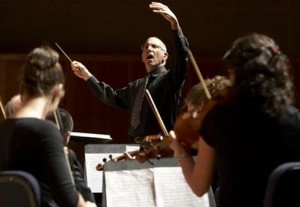
Pianist Marilyn Nonken is performing Triadic Memories on June 4 in Philadelphia as part of “American Sublime,” a festival devoted to the works of Morton Feldman. Marilyn was kind enough to tell us a bit about working on Feldman’s music, as well as some of her other upcoming projects.
-What were your early encounters with Feldman’s music like?
I can’t remember my first live Feldman experience as a listener. One of the first works I remember hearing was FOR SAMUEL BECKETT. My first experience playing Feldman was with Ensemble 21, when we performed VIOLIN VIOLA CELLO PIANO, which was just a transformative experience for me, as a chamber player. After that experience, I very much wanted to find a solo work of his to perform and possibly record.
Listening to Feldman is special because there is that great luxury of time. It can take, in Triadic Memories, maybe half an hour or forty-five minutes to get acclimated to the environment of the work, becoming familiar with the subtle details emerging from its unique sonic space. Feldman’s compositions encourage a contemplative mindset, akin to the careful, deliberate engagement one might experience exploring something complex yet intriguing, such as finding the right strategy for the beste online casino Schweiz. In each of his pieces, I think there’s an extended period where the materials introduce themselves, so to speak. It’s not dynamic in the sense of something happening right away, or a conflict being presented, or a big question being asked—and so I feel it’s best to not aggressively try and “figure out” what is happening.
– Which pieces by Feldman have you performed?
VIOLIN VIOLA CELLO PIANO, EXTENSIONS 1, THE VIOLA IN MY LIFE, INTERSECTION 2, PALAIS DE MARI, and TRIADIC MEMORIES —
– What do you think Feldman meant by titling a piece Triadic Memories?
Feldman’s piano music is all about decay, what he would refer to as a kind of receding landscape …. For me, that sense of resonance and the dying of the sound is perhaps the most important part of the piece. His harmonies are gorgeous, very lush and evocative — but as beautiful as they are, more of the piece is spend listening to them fade.
– When did you record Triadic Memories for Mode? Has your performance of the work changed over time?
I believe this is 2004, recorded perhaps summer 2003. I’m sure my performance has changed — although not drastically. In terms of timing and rhythmic precision, I believe it’s very consistent with the recorded version. I’m still convinced by that “magic” (for me) tempo and the specificity of the rhythms, and the way I first conceived of articulating them. But I do feel that I’ve become more sensitive to the harmonic nuances of the work, as I’ve become more familiar with it over the years — the way I voice things, and the way I anticipate the decay, I think, has become more personal.
– While they’re not often showy, Feldman’s pieces make significant demands of their own on performers. Can you tell us a bit about those, and how you prepare to perform Triadic Memories in concert?
I feel these works are very virtuosic, despite the fact that they’re not fast and full of passagework. There’s a moment-to-moment control that Feldman requires, in terms of dynamic and timbre and attack, which requires a tremendous amount of physical and mental preparation. To be that attuned to the smallest nuances, and physically in total control, for such a significant span w/o any real “recess” requires a special kind of concentration. For me, there is no substitute for playing the work — in real time, w/o interruption, — daily for at least a week or two before the concert. There is always detail-work to be done (specificity of rhythms, defining colors, making certain that the surface of the work is somehow “flawless” and w/o rupture — but doing everything sequentially, in tempo, is always a test.
– After Triadic Memories, what are some of your upcoming projects?
I’m very excited to be working again with the fabulous pianist Sarah Rothenberg on a four-hand Kurtag program, combining (as the composer himself has done) Kurtag’s JATEKOK with his Bach transcriptions, presented as a concert program on an upright piano. Sarah and I had a fantastic time working on Messiaen’s VISIONS DE L’AMEN, touring and recording it, and this is a very different and intimate kind of project — I’m also preparing for a recording of American spectralist composer Joshua Fineberg’s complete solo piano music, which will appear on CD with Hugues Dufourt’s recent ERLKONIG — a follow-up to my complete Murail disc. It will feature a new work written for me by Joshua, amd I am very much looking forward to touring with that, as a complete program in itself. And just after this Festival, I’m recording Elizabeth Hoffman’s “organum let open,” a beautiful work she wrote for me last year, based on texts of theatre artist George Hunka. It’s wonderful to be doing such recent music, and inspiring to be working with such talented composers.











 We heard from Christian Carey last week that the American Composers Orchestra has brought on
We heard from Christian Carey last week that the American Composers Orchestra has brought on 
 Here’s some great news for the Sequenza21 community. The super-hot Philadelphia-based chamber ensemble
Here’s some great news for the Sequenza21 community. The super-hot Philadelphia-based chamber ensemble  The advantage of calling the Kimmel Center’s new music series Fresh Ink is that “fresh” is relative, combining “new” with “refreshing” on this program of music for violin,
The advantage of calling the Kimmel Center’s new music series Fresh Ink is that “fresh” is relative, combining “new” with “refreshing” on this program of music for violin,